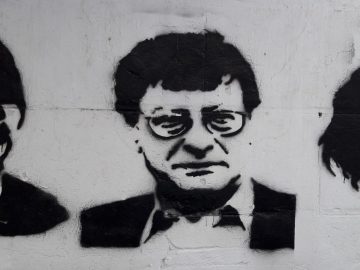Zeina G. Halabi at Eurozine:
 This dialectical reconstruction of exile is one of the most revealing portraits of Darwish. Invoking his poetry’s prophetic iconography, it evokes displacement, absence, and the privilege of representation, about who speaks for the wandering people and how. It asks the question of how exile is framed temporally, probing the conceptions of time at work in this experience. Palestine is thus revealed across three successive temporalities: historically embedded in Biblical tradition and collective memory; a signifier in the present of displacement and loss; and projected into the future by the spectral figure of the exiled poet-prophet. The scene is thus about the intertwinement of the lyrical and the political, the personal and the collective, and the spectral and messianic; all set the parameters of the intellectual-prophet.
This dialectical reconstruction of exile is one of the most revealing portraits of Darwish. Invoking his poetry’s prophetic iconography, it evokes displacement, absence, and the privilege of representation, about who speaks for the wandering people and how. It asks the question of how exile is framed temporally, probing the conceptions of time at work in this experience. Palestine is thus revealed across three successive temporalities: historically embedded in Biblical tradition and collective memory; a signifier in the present of displacement and loss; and projected into the future by the spectral figure of the exiled poet-prophet. The scene is thus about the intertwinement of the lyrical and the political, the personal and the collective, and the spectral and messianic; all set the parameters of the intellectual-prophet.
This is where the enmeshment of the poet-prophet, Palestine, and manifold temporalities turn into a metanarrative. We watch Bitton representing Darwish; he represents the Palestinians in 1997 from the vantage point of today’s coups, revolutions, and civil wars, all of which have had an effect on the conception of the ‘prophetic intellectual’.
more here.
